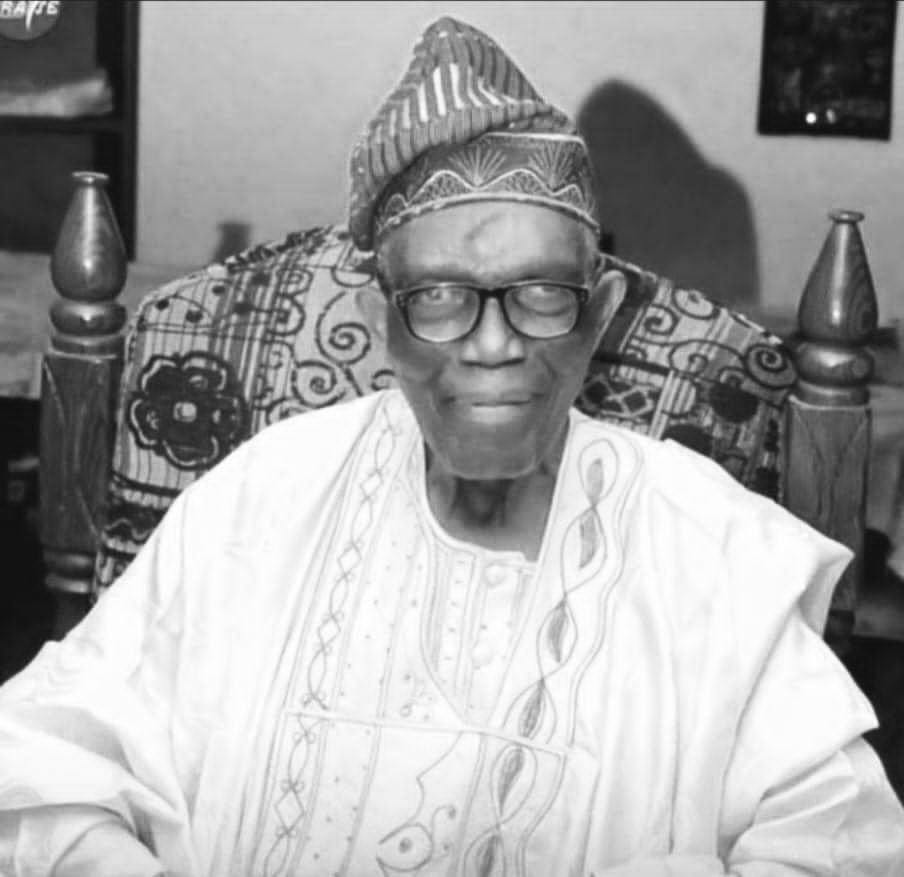On Wednesday, October 22nd, 2025, I received a very short message from Mrs. Abiola Aderibigbe, daughter-in-law of the late Chief Joseph Aderibigbe: *”Baba Aderibigbe has gone to rest.”* It was like being hit with a hammer on the head! Too many thoughts ran through my mind as the reader would discover in the course of reading this piece. Well, in response to Mrs Abiola Aderibigbe’s message, I then wrote a short tribute to the old man:
“Oh dear.
The death of an old man in Africa is the equivalent of the burning of a whole library. With the passing of Chief Joseph Aderibigbe, we have lost more than a library! He was the quintessential representative of the old tradition of committed patriotic service to fatherland, faith, and honour. May the Almighty God rest his soul, and may He give the family the fortitude to bear his passing. Amin. ”
The last time I was going to Ilorin, on the 12th of August, I sent this message to Mrs Aderibigbe:
“Good evening, Biola. It’s been quite a while! How are you doing? I just want to let you know that I will be in Ilorin from tomorrow, Tuesday, until the 22nd of August. I’m wondering whether we could set up the interview we’ve discussed with Chief Aderibigbe during my stay in Ilorin. Let me know if that can be set up. My best wishes.”.
“Good afternoon… I’m sorry I’m just responding. Pls let me get back to you on this. ”
On the following day, the 13th, I received this:
“Good afternoon.
Unfortunately, the interview won’t be feasible on this trip. But I’d love to explore alternative arrangements for another time. Kindly let me know if you have any upcoming plans to visit Ilorin so that my husband can plan towards meeting up with you.
Thank you. ”
The message of Wednesday, 22nd October, was final; the venerable old man, Chief Joseph Aderibigbe, had passed. Unfortunately, I didn’t get to do that interview. We had planned it several times, Mr. Adekunle and Mrs. Adekunle Aderibigbe and myself, but somehow, other factors intervened, which made it impossible. That’s why I feel very sad about Chief Aderibigbe’s passing.
The last time that I interviewed him was live on television at KWTV, Ilorin. It was on October 1st, 1998. I was the pioneer GM of KWTV, and as part of Nigerian Independence Day celebrations, I had invited him for a live interview. He obliged me, and that turned out to be a most remarkable experience for me.
I confirmed something that’s a remarkable trend amongst the old men who worked directly with the late Sir Ahmadu Bello. They all retained a fierce loyalty to his memory. I saw it with Malam Yahaya Gusau, Chief Sunday Awoniyi, Malam Adamu Ciroma, and Malam Adamu, Wazirin Fika. I also gleaned that from Malam Mamman Daura, and I’ve read the accounts of several others, and Chief Aderibigbe was not different. He spoke with tremendous respect about his life as a civil servant who worked directly with Sir Ahmadu Bello.
On that Independence Day encounter, I recall three examples. The first was that Chief Aderibigbe, who was the Provincial Secretary of Sokoto (the equivalent of Governor today), was actually one of the last people to see the Premier, Sir Ahmadu Bello, alive.
He had travelled from Sokoto to Kaduna on January 14th, 1966, to see Sir Ahmadu Bello. It was a whistle stop visit because he had actually been on the way to Ilorin and then to the Western Region. He was going to meet a lawyer who defended his brother, who had been arrested because he was the only member or supporter of the Northern People’s Congress (NPC) in some Western Nigerian town. A corpse had been placed somewhere close to his residence, and he was then arrested and had been on trial.
Sir Ahmadu Bello had sympathized with him and just before he left, joked that soon as he left Ilorin, he must ensure that he changed his Northern cap for a Yoruba one, so that he would also not be roped into any problems. They agreed to meet again on his way back to Sokoto, but the Premier was killed in the early hours of January 15th, 1966. The meeting therefore didn’t take place.
The second account was from his position as the Provincial Secretary of Sokoto. The councillors of the Sokoto Native Authority had voted to purchase a new Mercedes-Benz car for the Sultan of Sokoto. Such a vote needed the approval of the Provincial Secretary, and in this case, Chief Joseph Aderibigbe. The only problem was that the vehicle in question was costing the entire amount of money to run the administration, so he didn’t approve and kept the memo in his locker.
One afternoon, he was having his siesta, like a good, colonially-tutored administrator, when he got a knock on his bedroom door. He was informed that the Premier, Sir Ahmadu Bello, was in the compound, along with all the other councillors of the Sokoto Native Authority. Chief Aderibigbe told me that Sir Ahmadu Bello never resigned his position as a councillor in Sokoto despite his station as the Premier of Northern Nigeria!
The provincial secretary said he scampered out of bed still in his pyjamas to meet the Premier and his entourage. Sir Ahmadu Bello profusely apologized that they disrupted his siesta and insisted that they would wait for him to be properly dressed before alighting from their vehicles.
Inside his office, a few minutes later, the Premier once again excused their unannounced visit and told him, ChiefJoseph Aderibigbe, that he had led his colleagues to plead for him to approve the resolution to purchase the vehicle for the Sultan of Sokoto.
Chief Aderibigbe added that he opened his locker there and then wanted to do the approval. But the premier told him to take his time and to do it properly, after the team of councillors had departed. The approval was done eventually, and the vehicle was purchased. It filtered back to him that some of the councillors had been disappointed that Sir Ahmadu Bello did not give a marching order to a provincial secretary who they felt was “too stubborn”! The premier said such an order would have undermined the Provincial Secretary’s position. Sir Ahmadu Bello told his colleagues in the Sokoto Native Authority that Joseph Aderibigbe was in the position because of his competence!
The third account I got from Chief Aderibigbe came from after the creation of Kwara State in 1967. The state was a merger of the old Kabba and Ilorin Provinces. Ilorin had been named the state capital after an incredible level of machinations. Old bureaucrats and other prominent individuals from the Kabba provincial end then argued that the Chairman of the Kwara State Traditional Council should be appointed from their own, Kabba Provincial end, in an attempt to balance the fact that Ilorin had been made the state capital. They wanted the Attah of Igala as the Chairman of the Kwara State Traditional Council!
It was Chief Joseph Aderibigbe who provided the answer to break what had become an uncomfortable impasse between the two sides. He pointed out that there was the “Order of Proceedings” of Northern Nigeria, which had listed the exact status of the emirs and chiefs of the region. When they consulted the document, it was clear that the most senior Traditional Ruler in what became Kwara State was, in fact, the Emir of Ilorin. He belongs to the exclusive list that is often referred to as “Northern Nigeria’s First Eleven”! That is the eleven top-most emirs or chiefs of Northern Nigeria. There was no way that the Attah of Igala could have become the chairman. It had to be the Emir of Ilorin.
I escorted Chief Aderibigbe back to his residence in the GRA and I also visited him a couple of times after, before I eventually resigned my appointment with KWTV in 2002, to move to Abuja as pioneer editor of Daily Trust newspaper. I recall that a picture of the late Sir Ahmadu Bello had a prominent place on his wall. It further deepened my appreciation of the man’s sense of loyalty to Sir Ahmadu Bello, along with his contemporaries.
They were a very privileged set of individuals because Northern Nigeria gave them a lot of opportunities. But they also reciprocated by working with an incredible sense of honour, commitment, and unalloyed patriotism. It was a rare moment in our national history when talent flowed into opportunity, and an outcome of tremendous possibilities also followed. It was, therefore, no coincidence that we have continued to valorise these remarkable individuals and their places in our history.
With Chief Joseph Aderibigbe’s passing at the ripe age of 104 years, we have indeed seen a practical example of the burning of an entire library of remembrance. It was the Malian, Professor Hampate Ba, who said that the death of an old man or woman in Africa is the equivalent of the burning of a library. Sir (Chief) Joseph Adeniyi Aderibigbe, KHF, JP, was indeed a truly venerable patriot, civil servant, community leader, and an outstanding individual whom the Almighty God gave a very long life. He served as Head of Service (HOS) and Secretary to the State Government (SSG), with the creation of Kwara State in 1967. They don’t make their types anymore in our administrative and political systems. No.
Is’haq Modibbo Kawu, Ph.D, FNGE.
Saturday, October 25th, 2025.


